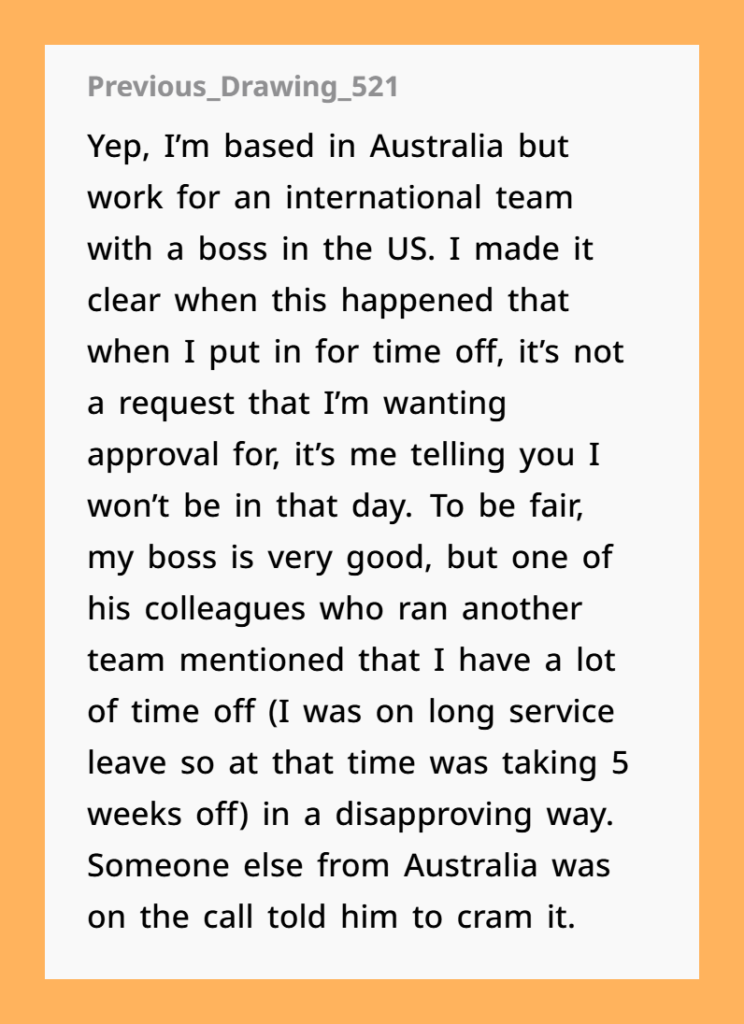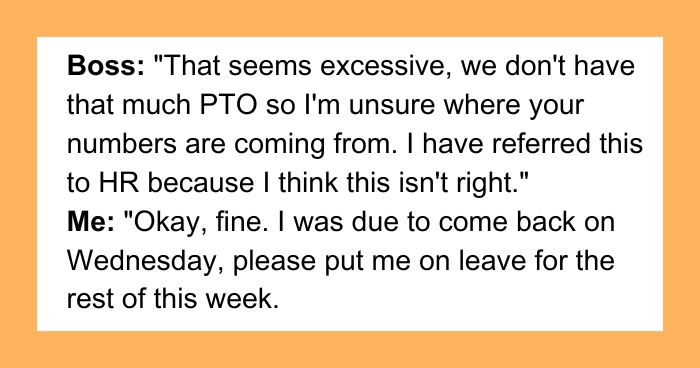“American Boss Shocked by European Vacation Rules — Gets a Reality Check”
Managing employee motivation can be challenging, but destroying workplace morale is surprisingly easy. A hallmark of exceptional leadership is respecting employees’ rights and upholding employment contracts. In contrast, toxic bosses often resort to micromanagement, ignore labor laws, and penalize workers for utilizing their legally entitled paid time off.
One Reddit user, u/FMLitsSML, went viral in the r/MildlyInfuriating subreddit after sharing her experience with a new manager who reported her to human resources for taking the vacation days guaranteed in her employment contract. The story quickly sparked a debate on employee rights, hostile work environments, and poor HR practices. Keep reading to discover how this workplace drama unfolded—and how the internet responded to such an unfair situation.

















Why Paid Time Off and Work-Life Balance Are Crucial for Employee Productivity and Company Success
A well-rested, motivated workforce is one of the most powerful assets any company can have. And yet, despite clear evidence that paid time off policies directly improve employee productivity, some employers still push back against their workers using their legally entitled leave.
Supporting your staff’s right to take time off isn’t just about HR compliance—it’s also about building a workplace culture of trust, loyalty, and long-term retention. When businesses prioritize employee well-being, the entire organization benefits from improved morale, stronger performance, and higher profitability.
The ROI of Supporting Work-Life Balance
Employees with a healthy work-life balance are more engaged, more loyal, and far less likely to experience workplace burnout. Giving your team the freedom to rest, spend time with loved ones, and pursue their personal passions outside of work recharges them in a way that makes them more creative, energized, and collaborative once they return.
On the flip side, companies that foster toxic work environments—through micromanagement, unrealistic expectations, or discouraging time off—risk demotivating their staff, increasing turnover, and hurting overall performance.
When workers feel overworked and underappreciated, they may emotionally disengage, stop caring about their tasks, and begin looking for new job opportunities. This leads to increased hiring costs, slower team output, and ultimately, lower revenue.
Recognizing Burnout Before It’s Too Late
According to the Harvard Business Review, burnout has three main symptoms: exhaustion, cynicism, and inefficacy. This trifecta can wreak havoc on both an individual’s career trajectory and an entire company’s productivity levels.
- Exhaustion shows up first, often due to poor boundaries, lack of rest, and constant stress.
- Then comes cynicism, as employees lose interest in their work and start mentally checking out.
- Finally, inefficacy kicks in—where individuals begin doubting their abilities and feel they’re no longer making a meaningful contribution.
If not addressed quickly, these symptoms can result in long-term mental health issues, missed project deadlines, and significant losses in overall team performance.
How Better Sleep Boosts Performance and Health
While vacation time is critical, daily rest and recovery are equally important. According to the Cleveland Clinic, even a slight sleep deficit can weaken your immune system, reduce memory and focus, and increase the risk of anxiety and depression.
Sleep deprivation in the workplace doesn’t just affect individual health—it compromises decision-making, attention to detail, and innovation across teams. Encouraging your employees to maintain consistent sleep habits can help boost their energy, focus, and resilience.
Organizations that implement flexible work schedules give their staff the opportunity to work during their most productive hours while still prioritizing quality sleep. Some companies are even exploring creative perks like on-site nap rooms, although this approach isn’t ideal for every work culture.
How to Create a Supportive Work Culture That Encourages Boundaries
If you’re a manager or business owner, consider these work-life balance tips to improve employee satisfaction and reduce burnout risk:
- Promote the use of paid time off benefits without guilt or backlash
- Discourage unpaid overtime or after-hours emails
- Encourage team members to disconnect after work
- Set realistic expectations around workloads and project timelines
- Provide access to mental health support or wellness programs
- Consider offering remote work flexibility or hybrid options
Later, the author shared a few more details about what happened, in the comments of her post





Final Thoughts: Empowering Employees to Stand Up for Their Rights
Every employee deserves a workplace that respects their time, energy, and well-being. If you find yourself working under someone who discourages you from taking your paid leave, know that you have options. Start by addressing the issue directly, escalate to human resources if needed, or reach out to a labor union representative for legal advice.
If the environment remains toxic despite your efforts, it may be time to explore new job opportunities at companies that truly value employee mental health and retention.




